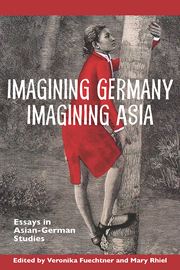Book contents
- Frontmatter
- Contents
- Acknowledgments
- Introduction
- Part I Contemporary Challenges to German Borders and Identities
- Part II Travel and Representation
- 5 Germany's India: A Critical Re-interrogation
- 6 Indians, Jews, and Sex: Magnus Hirschfeld and Indian Sexology
- 7 The Ambivalence of a Spiritual Quest in India: Waldemar Bonsels's Indienfahrt
- 8 Traveling through Imperialism: Representational Crisis and Resolution in Elisabeth von Heyking's and Alfons Paquet's Travel Writing on China
- 9 Measuring Asian-ness: Erwin Baelz's Anthropological Expeditions in Fin-de-Siècle Korea
- Part III Asia Inhabits Germany's Cultural and Intellectual History
- Bibliography
- Notes on the Contributors
- Index
8 - Traveling through Imperialism: Representational Crisis and Resolution in Elisabeth von Heyking's and Alfons Paquet's Travel Writing on China
from Part II - Travel and Representation
- Frontmatter
- Contents
- Acknowledgments
- Introduction
- Part I Contemporary Challenges to German Borders and Identities
- Part II Travel and Representation
- 5 Germany's India: A Critical Re-interrogation
- 6 Indians, Jews, and Sex: Magnus Hirschfeld and Indian Sexology
- 7 The Ambivalence of a Spiritual Quest in India: Waldemar Bonsels's Indienfahrt
- 8 Traveling through Imperialism: Representational Crisis and Resolution in Elisabeth von Heyking's and Alfons Paquet's Travel Writing on China
- 9 Measuring Asian-ness: Erwin Baelz's Anthropological Expeditions in Fin-de-Siècle Korea
- Part III Asia Inhabits Germany's Cultural and Intellectual History
- Bibliography
- Notes on the Contributors
- Index
Summary
Introduction: China, Imperialism, and Writing
This essay reflects on two travel texts that are located at the cross-roads of travel writing and Germany's imperial interest in China at the turn of the twentieth century. By the end of the nineteenth century China had become the Schauplatz of the conflict between land-grabbing imperialists, among which Germany was seen as an increasingly important player. In 1898, two years before the Boxer Rebellion began, Germany secured its concession in Qingdao (Kiaochow). Even better known than Germany's imperial conquest in China, the Boxer Rebellion in 1900 received extensive media exposure, in part because Germany's ambassador, Clemens von Ketteler, was killed in the fighting. Suzanne Marchand draws attention to the important role that the rebellion played in focusing Germany's interest on China, a place that until then had remained remote and irrelevant to the population as well as to the academy. Now, writes Marchand, in the wake of the media coverage of the rebellion, “events in China seem quite suddenly ‘world-historical.’” The German population had taken little notice of China, and Marchand's research shows that the academy had little interest in the academic study of the Chinese language and culture throughout the nineteenth century. however, other more popular forms of writing on China became an important source for the construction of the Chinese other at the turn of the century, and travel writing was one of these.
- Type
- Chapter
- Information
- Imagining Germany Imagining AsiaEssays in Asian-German Studies, pp. 155 - 172Publisher: Boydell & BrewerPrint publication year: 2013

